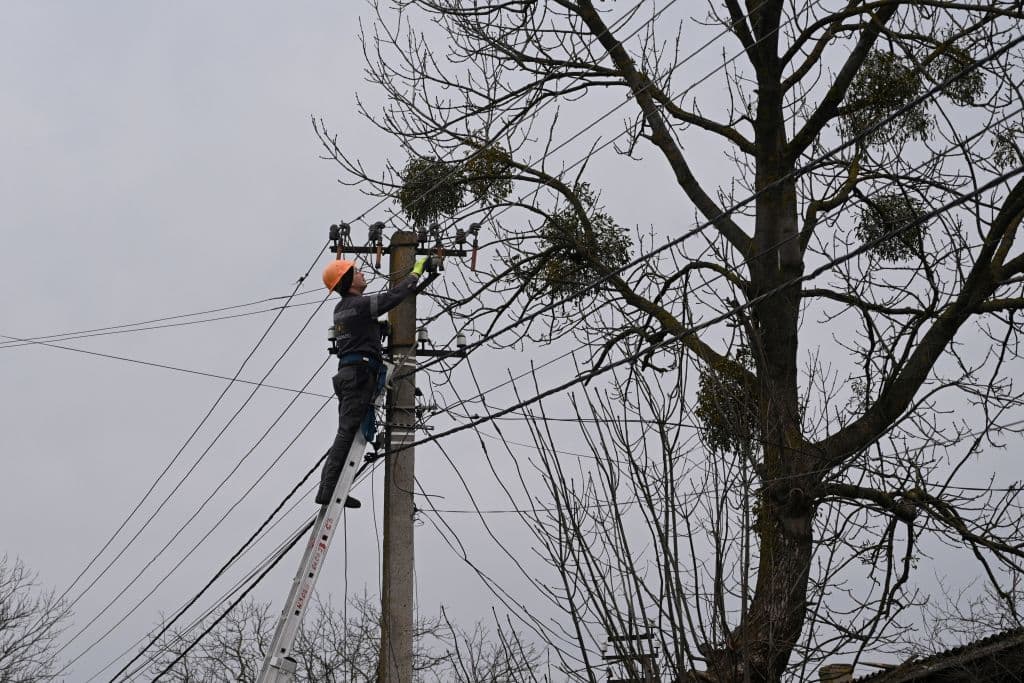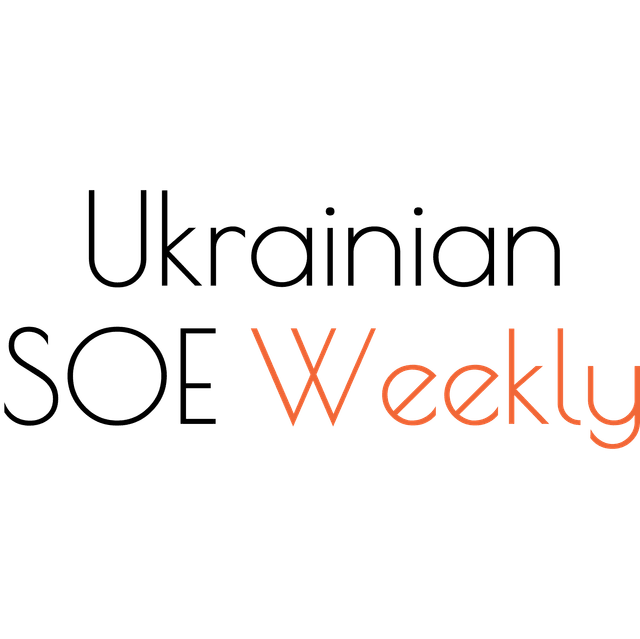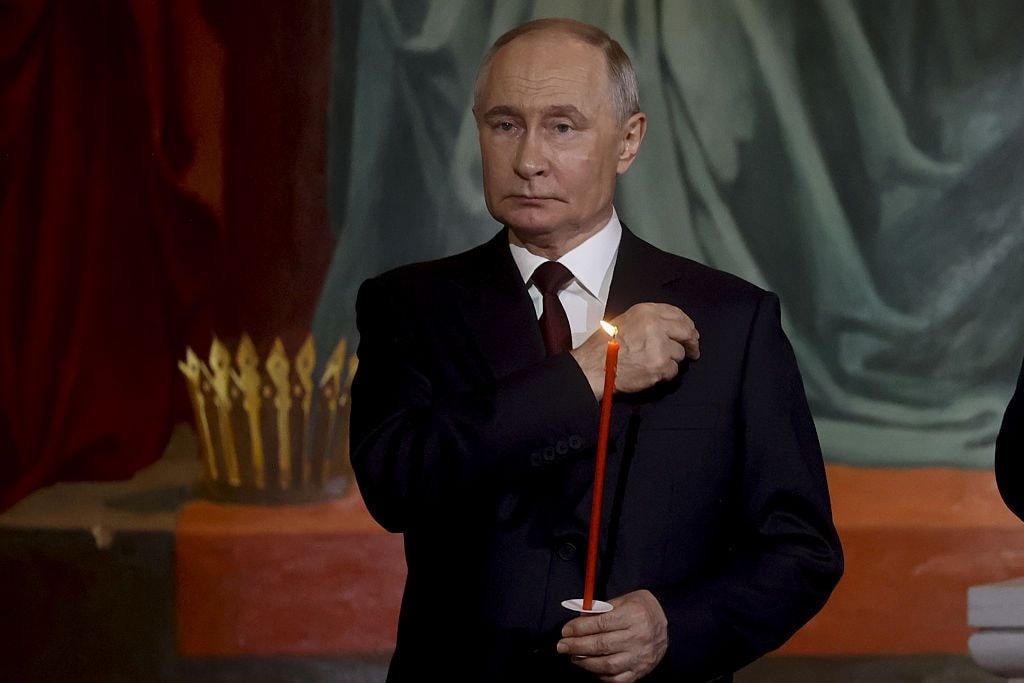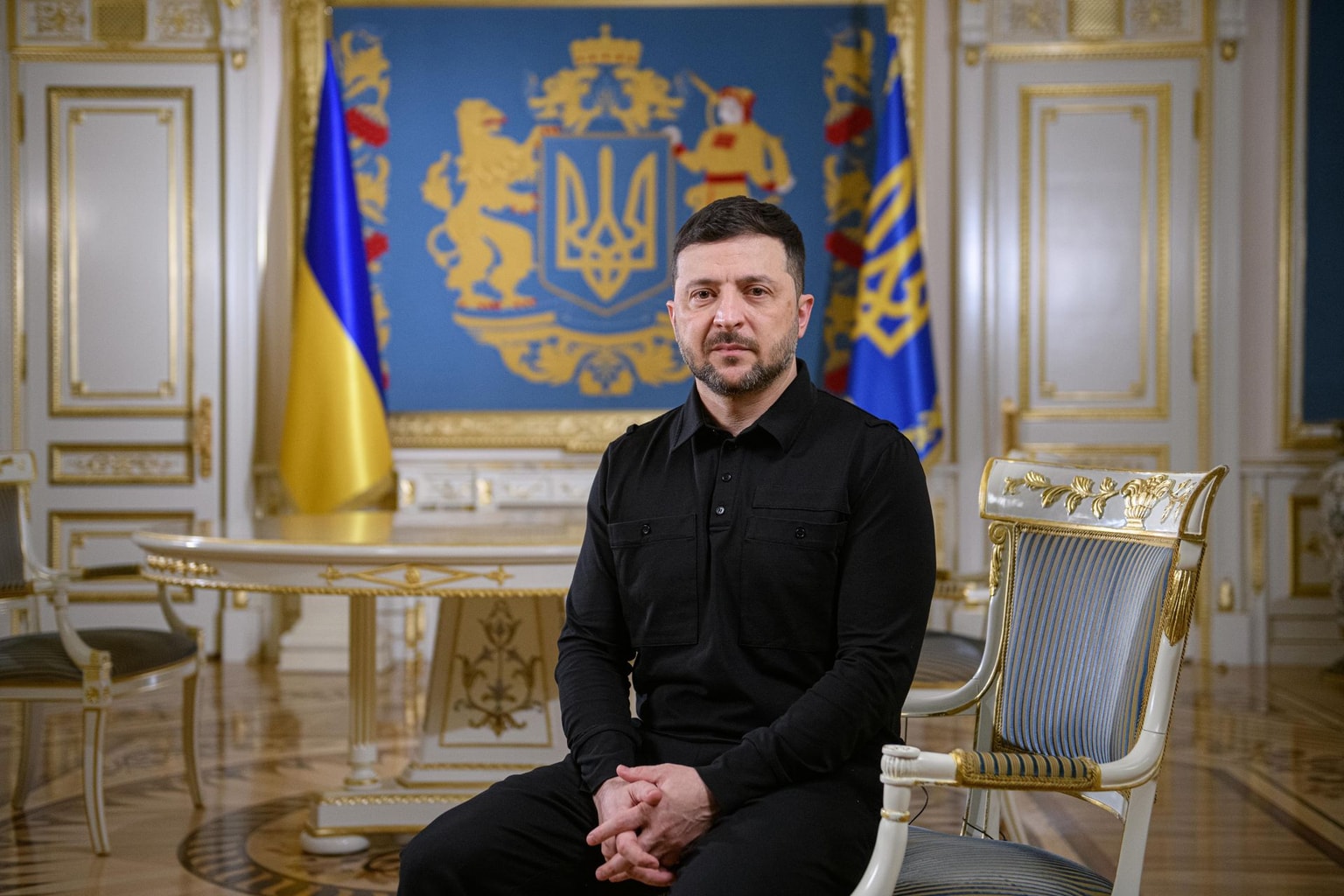Editor’s Note: This is issue 78 of Ukrainian State-Owned Enterprises Weekly, covering events from March 4-10, 2023. The Kyiv Independent is reposting it with permission.
Ukrainian SOE Weekly is an independent weekly digest based on a compilation of the most important news related to state-owned enterprises (SOEs) and state-owned banks in Ukraine. This publication was produced with the financial support of the European Union within the project “Supporting Ukraine in rebuilding and recovery” implemented by the KSE Institute. The contents of this publication are the sole responsibility of the editorial team of the Ukrainian SOE Weekly and do not necessarily reflect the views of the European Union.
Corporate governance of SOEs
Kobolyev fails to post bail, SAPO demands a tougher one. On March 7, the Specialized Anti-Corruption Prosecutor’s Office (SAPO) reported that former Naftogaz CEO Andriy Kobolyev did not pay his required bail of Hr 229 million ($6.3 million).
As of March 7, almost Hr 97 million ($2.7 million) has been paid for Kobolyev’s bail, according to SAPO prosecutors. Per the court decision, the bail must be paid in full to the accounts of the State Treasury Service of Ukraine no later than five days after the court ruling is announced. The final deadline was March 6, SAPO said.
As a result, a SAPO prosecutor filed a motion requesting the National Anti-Corruption Bureau of Ukraine (NABU) to apply a more stringent preventive measure to the suspect, namely detention with a bail of Hr 365 million. This is the equivalent of $10 million, which Kobolyev received as the first tranche of his allegedly illegal bonus, according to SAPO.
SAPO added that neither Kobolyev’s Ukrainian nor foreign bank accounts have been seized, despite requests to do so from NABU and SAPO.
Kobolyev wrote on his Facebook page that his foreign accounts are currently blocked until the circumstances of the criminal proceedings are clarified. According to Kobolyev, his accounts in Ukraine were arrested at the end of December 2022 for reasons that are still unclear to him.
He added that after he was able to access them, he deposited all the funds from these accounts as part of the bail. This was about Hr 1 million ($27,000), according to Kobolyev. He also mentioned that he has kept his assets abroad since he was issued a personal Hr 8 billion ($219 million) fine in the past.
On March 9, the law firm Miller which represents Kobolyev in this litigation reported that the High Anti-Corruption Court (HACC) held a meeting on March 10, at which the SAPO reiterated its request for Kobolyev’s arrest, with the bail of Hr 365 million ($10 million).
The law firm said that it filed an overview of correspondence between Naftogaz’s corporate secretary (Mariya Sukhan), chair of the supervisory board’s nomination and remuneration committee (Amos Hochstein), the legal advisor (Olena Kuchynska), and others. This correspondence should show that the bonus decisions were made in several steps, Miller added.
The HACC will continue to consider the matter on March 13.
In SOE Weekly (Issue 71), we reported that on Jan. 19, NABU and SAPO notified Kobolyev that he was suspected of misappropriating (illegally awarding himself) over Hr 229 million ($6.3 million) in 2018.
This payment was part of the bonuses granted to Naftogaz’s team in May 2018 for the company’s historic victory against Russia’s Gazprom in Stockholm’s court of arbitration.
It is unclear why NABU and SAPO posed no questions to supervisory board members who took the primary decision on paying this bonus, including members of the board’s nomination and remuneration committee, which should have examined any decisions relating to the remuneration of the CEO and provided a recommendation to the supervisory board regarding the approval of such decisions. Under Ukrainian law, supervisory board members of joint-stock companies (as well as CEOs and company officials) are responsible for losses caused by their actions or inaction.
For a more detailed overview of this case, see SOE Weekly’s Issue 71.
In SOE Weekly (Issue 72), we reported that on Jan. 23, the HACC refused to grant the NABU detective’s request to detain Kobolyev.
In SOE Weekly (Issue 73), we reported that the judge of the HACC ruled that SAPO’s motion to detain Kobolyev was unfounded. On Jan. 31, SAPO challenged the HACC’s decision.
In SOE Weekly (Issue 77), we reported that the Appeals Chamber of the HACC partially satisfied the motion of SAPO and NABU, setting bail at Hr 229 million ($6.3 million), which Kobolyev had until March 6 to pay.
Chair of MGU’s supervisory board resigns. According to media reports, the chair of the supervisory board of the Main Gas Pipelines of Ukraine – Mahistralni Gazoprovody Ukrainy (MGU), Huberte Bettonville, filed her resignation notice to the company’s shareholder, the Energy Ministry.
According to Ukrainian law, such a resignation notice should be filed at least two weeks in advance. If Bettonville filed her resignation notice on March 6, as media reports appear to suggest, then her resignation should be effective on March 20 or later.
“Despite my sincere efforts for the sake of the company and the war effort of Ukraine, some of the (supervisory board) members have proven that they will not and cannot apply EU standards and corporate governance principles, and they should be ashamed of themselves. They are the main reason for my resignation,” Bettonville wrote in the reasoning behind her decision. She also stated that she could no longer participate in the decision-making process and create additional value for the company.
Speaking with the intelligence services agency ICIS a day after her resignation, Bettonville said that her efforts to liquidate MGU, appoint a new CEO at the Gas Transmission System Operator of Ukraine (GTSOU), and reduce the GTSOU’s dependence on Russian transit income have been thwarted. She said that she felt frustrated that in 15 months of tenure, the supervisory board could not achieve anything tangible, depending instead on approvals from the government.
Bettonville said that she felt that some members of the supervisory board had “an agenda” although she did not specify whom she was talking about or what this agenda entailed.
In the past, sources close to the GTSOU raised concerns about nepotism and attempts by some of the state representatives on the supervisory board to appoint closely connected people to high-ranking positions, ICIS wrote.
The supervisory board of the MGU consists of five members, including two state representatives (Viktor Pynzenyk and Tetiana Fedorova) and three independent members (Huberte Bettonville, Jan Chadam, and Iryna Marushko). Bettonville chaired the MGU’s board.
Decisions of the supervisory board are made by a simple majority of votes, with the chair having a casting vote in case of a tie.
This suggests that Bettonville was dissatisfied with at least one state representative and at least one independent member of the board.
Bettonville also bemoaned the fact that the GTSOU did not have a permanent CEO after the previous CEO, Serhiy Makogon, was dismissed by the MGU in September 2022. She also added that she considered Makogon “a good person with strong lobbying abilities.”
The decision to dismiss Makogon was made by the MGU’s supervisory board. Bettonville did not make it clear whether she voted in favour of Makogon’s dismissal in September 2022.
She said that a new CEO, Dmytro Lyppa, was selected by the MGU on Dec. 31, but he could not take over the position because decisions by the Ministry of Energy and the Cabinet of Ministers were still pending, raising questions about the independence of the MGU.
The sole shareholder of the MGU is the Ministry of Energy. The MGU is the owner of the GTSOU, and the MGU’s supervisory board acts as the general meeting of the GTSOU.
Bettonville also noted that the acting CEO of the MGU (Oleksandr Lisnichenko) left the company and fled the country earlier in February.
Instead, Dmytro Fudashkin took over (apparently, as acting CEO). A source close to the GTSOU told ICIS that Fudashkin is a close associate of Viktor Pynzenyk, one of the state representatives on the MGU’s supervisory board.
It is unclear when or how Fudashkin was appointed. According to the MGU’s website, Lisnichenko is still the acting CEO. According to SMIDA, the acting CEO is Valeriy Nozdrin, who had been appointed as such when the MGU was established in 2017.
Makogon wrote on his Facebook page that this was not the first time that Bettonville was announcing her resignation, which was yet to be confirmed.
In SOE Weekly (Issue 76), we reported that the supervisory board of the MGU has yet to appoint a new CEO for the GTSOU, more than five months after the dismissal of the previous CEO, Makogon, in September 2022.
The MGU’s supervisory board announced a competitive CEO selection on Nov. 2. No further information has been released publicly, including how many candidates applied or when the selection would be completed.
According to Ukraine’s law, the CEO candidate for the GTSOU must be first approved by the Cabinet of Ministers and only then appointed by the MGU’s supervisory board.
In SOE Weekly (Issue 67), we reported that the candidate list leaked to the media. According to Ekonomichna Pravda’s sources, 19 candidates were longlisted by Dec. 19. The submission deadline was Dec. 12, suggesting that all applicants were screened, and the longlist was drawn up in less than a week.
In SOE Weekly (Issue 67), we reported that the previous CEO, Makogon, was dismissed by the MGU’s supervisory board on Sept. 16. Makogon was succeeded by acting CEO Paweł Józef Stańczak. Prior to that, Stańczak worked as the GTSOU’s Deputy CEO for Development and Transformation.
Makogon criticized the new competitive selection, noting that the longlist included no foreign candidates. He said that the selection procedure was for show, and he had no doubt as to who would be shortlisted. Makogon said that many reputable candidates, who were contacted by the executive search company supporting the selection (Odgers Berndtson), flatly refused to apply.
Earlier, Makogon said that before his dismissal, the MGU wanted to establish an executive board, allegedly aiming at diluting Makogon’s powers without dismissing him. However, now that he has been dismissed, the MGU no longer requires any executive board and merely wants to appoint a loyal CEO, Makogon claimed.
According to media reports, in June 2022, the MGU’s supervisory board formally proposed Serhiy Oleksiyenko and Andriy Khomenko as CEO candidates without a competitive selection, but the Cabinet did not approve either.
Finance Ministry demands a speedier corporate governance reform of the GTSOU. According to Ekonomichna Pravda, the Ministry of Finance asked the Ministry of Energy to speed up the corporate governance reform of the GTSOU, as it is a prerequisite for Ukraine to receive 18 billion euros in macro-financial assistance from the European Union in 2023.
The Ministry of Finance said that this includes the introduction of a single-tier corporate model of GTSOU by transferring the company into direct ownership of the state (represented by the Ministry of Energy), the subsequent liquidation of the MGU, and the establishment of an independent supervisory board and an executive board at the GTSOU.
In SOE Weekly (Issue 71), we reported that European Pravda revealed the conditions that Ukraine must meet to receive the EU’s macro-financial assistance package. One of these conditions is to launch the corporate restructuring of the GTSOU by June 2023.
In SOE Weekly (Issue 67), we reported that on Oct. 4, the Energy Community Secretariat wrote a letter to Prime Minister Denys Shmyhal and Minister of Energy Herman Halushchenko, urging the government to immediately implement the GTSOU’s corporate governance action plan:
- transfer the ownership of the GTSOU from the MGU to the Ministry of Energy;
- adopt a new charter for the GTSOU, creating an independent supervisory board at the GTSOU;
- run a competitive selection of supervisory board members for the GTSOU;
- have an executive board elected and appointed by the GTSOU’s new supervisory board after the latter is established.
Note that these are precisely the points that the above letter from the Finance Ministry emphasizes.
Two out of three state representatives on PrivatBank’s supervisory board re-appointed. On March 3, the Cabinet of Ministers re-appointed two state representatives on the supervisory board of PrivatBank for a second term.
Yulia Metzger’s tenure was prolonged as the President’s nominee, and Artem Shevalev’s, as the Cabinet’s nominee.
Metzger was appointed for her first term in July 2019. Shevalev was appointed in May 2019.
The supervisory board of PrivatBank consists of nine members, including six independent members and three state representatives.
The third state representative, nominated by the Verkhovna Rada, was Serhiy Oleksiyenko. No public information is available on the Rada’s plans to either re-appoint or replace him.
The competitive selection for supervisory board members for three Ukrainian state-owned banks – PrivatBank, Oschadbank, and Ukreximbank – started simultaneously on Oct. 11, with deadlines of Nov. 11.
In SOE Weekly (Issue 69), we reported that on Dec. 27, the Cabinet of Ministers dismissed almost all independent members of PrivatBank’s supervisory board and replaced them with new ones after a competitive selection.
There have been no public updates on the selections for Oschadbank or Ukreximbank.
State-owned banks spent almost half a billion hryvnia on remuneration to supervisory boards and executive boards in 2022. According to Ekonomichna Pravda, 68 members of executive and supervisory boards of four Ukrainian state-owned banks received Hr 477 million ($13 million) in salaries, bonuses, and other remuneration in 2022.
Apparently, EP uses the following sources of data for its calculations: PrivatBank, Oschadbank, Ukreximbank, and Ukrgasbank.
According to the remuneration reports of state-owned banks, most of this amount, Hr 301 million ($8.2 million), was executive boards’ remuneration. The rest, Hr 176 million ($4.8 million), went to supervisory boards, EP wrote.
PrivatBank, Ukraine’s largest bank, paid the most to its top executives and supervisory board members over the past year: over Hr 197.7 million ($5.4 million). It spent Hr 116.8 million ($3.2 million) on the executive board and Hr 80.9 million ($2.2 million) on the supervisory board.
In 2022, Ukreximbank paid its executive board members almost Hr 78 million ($2.1 million). Besides the base pay, this amount includes Hr 34 million ($930,000) in bonuses and Hr 12.8 million ($350,000) in “other payments in cash.” As the bank explained in its report, the executives donated their February 2022 bonuses to support the Armed Forces of Ukraine, EP added.
Ukreximbank spent a total of Hr 42.5 million ($1.2 million) on the supervisory board. The report notes that the board’s March remuneration was also given to the Armed Forces of Ukraine.
Oschadbank spent Hr 49.1 million ($1.1 million) on its executive board in 2022. These payments included salaries, compensation, and insurance premiums. The bank also paid Hr 46.2 million ($1.3 million) in remuneration and compensation to the supervisory board members.
Ukrgasbank spent a total of Hr 64 million ($1.8 million) on its executive and supervisory boards. The executive board members received Hr 57.3 million ($1.6 million) in salaries, compensation for martial law expenses, and additional benefits (including those from the trade union). Another Hr 6.7 million ($183,000) went to the supervisory board members.
According to EP, these were the state-owned banks’ average monthly pay-outs in 2022:
Bank’s name | Average executive boardmember's remuneration(rounded to thousands of hryvnia) | Average supervisory boardmember’s remuneration(rounded to thousands of hryvnia) | PrivatBank | Hr 1,081,000 ($29,560) | Hr 674,000 ($18,400) | Oschadbank | Hr 455,000 ($12,400) | Hr 428,000 ($11,700) | Ukreximbank | Hr 1,083,000 ($29,600) | Hr 394,000 ($10,700) | Ukrgasbank | Hr 597,000 ($16,300) | Hr 93,000 ($2,500) Notably, the average executive board member’s remuneration at Ukreximbank was almost the same as that at PrivatBank. Ukreximbank is much smaller and posted heavy losses in 2022. Note that in November 2021, SOE Weekly team members Oleksandr Lysenko, Andriy Boytsun, and Dmytro Yablonovskyi analyzed the remuneration disclosure requirements for state-owned enterprises and banks, their enforcement, and the disclosed figures in an article titled “State-owned companies required to disclose salaries of board members and executives: How much they make and why not everyone reports”. These were the estimated average monthly salaries at state-owned banks for the year 2021:
|












